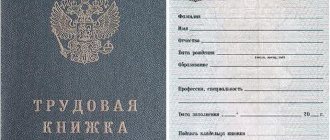What to do if they don’t issue an employment contract, or the employer refuses to draw one up at all? According to the law, the responsibility for formalizing the relationship between the employee and the employer rests with the latter. An employee has the right to stay at his workplace, if he does not have an employment contract, for only 3 days. This is the period allocated by the Labor Code for official registration.
But unfortunately, cases where an employee works at an enterprise without a contract for several months or even years are becoming more and more common. Moreover, this situation often suits even the most unemployed citizen.
Can an employee work without a contract?
A contract is an agreement under which the manager must provide the employee with a workplace, ensure normal operating conditions provided for by law, and pay wages on time.
In turn, the employee undertakes to perform the function established by the contract and to comply with the rules of procedure established in the organization. Consequently, the contract is a fundamental document that records the fact of the employee’s employment and the basic conditions for the performance of his work activities. It is possible to work without this document only if there is an alternative - a civil contract, which records the fact that a person provides paid work.
Attention! The actual admission of an employee to perform work at the enterprise means the beginning of an employment relationship.
Terms of signing the contract
If the employee is actually allowed to work, the employer must formalize the employment relationship with him in writing. The contract must be drawn up within 3 days.
Another common case is when an employee first worked under a civil contract, after which the parties decided to formalize the relationship under an employment contract. In this case, three days are given to conclude a new document, except in cases where the deadline for re-registration is established by court order.
Positive and negative points for the employer
Refusal to formalize relations with an employee is very popular due to several positive aspects:
- It may not be possible to provide an employee with a safe environment for work, because Labor Code norms do not apply to him.
- There is no need to remit taxes, which allows for significant savings.
- There is no need to clearly establish deadlines for paying wages or their exact amounts.
- It is possible to terminate the employment relationship at any time, ignoring the guarantees established in labor legislation for certain categories of citizens.
Important! The only negative point that an employer may face is liability.
Positive and negative points for the employee
Contrary to existing opinion, the absence of official registration can also be beneficial for the employee:
- The possibility of receiving a higher salary, since a person has the opportunity to work more hours than required by law.
- Work without documents.
- No additional obligations, for example, financial liability or trade secrets.
Besides this, there are many negative points:
- There are no labor guarantees.
- Lack of confidence in receiving wages.
- Working time is not included in the length of service, which will negatively affect the amount of the pension.
- Lack of confidence in work deadlines.
Labor Code on registration of labor relations
- on the employee’s personal performance for pay of a labor function (work according to the position in accordance with the staffing table, profession, specialty, indicating qualifications, the specific type of work assigned to the employee);
- on the employee’s subordination to the internal labor regulations when the employer provides working conditions provided for by labor legislation and other regulatory legal acts containing labor law norms, a collective agreement, agreements, local regulations, and an employment contract.
Labor relations arise between an employee and an employer on the basis of an employment contract concluded by them in accordance with the Labor Code (Article 16 of the Labor Code of the Russian Federation). Labor relations between an employee and an employer also arise on the basis of the employee’s actual admission to work with the knowledge or on behalf of the employer or his representative in the case where the employment contract was not properly drawn up.
An employment contract is an agreement between an employer and an employee, according to which the employer undertakes to provide the employee with work for a specified labor function, to provide working conditions provided for by labor legislation and other regulatory legal acts containing labor law norms, a collective agreement, agreements, local regulations and by this agreement, to pay the employee wages in a timely manner and in full, and the employee undertakes to personally perform the labor function determined by this agreement, to comply with the internal labor regulations in force for this employer (Article 56 of the Labor Code of the Russian Federation). The parties to the employment contract are the employer and the employee.
- one copy of the employment contract is given to the employee;
- another copy is kept by the employer.
An employment contract that is not drawn up in writing is considered concluded if the employee began work with the knowledge or on behalf of the employer or his representative (Part 2 of Article 67 of the Labor Code of the Russian Federation).
When an employee is actually admitted to work, the employer is obliged to conclude an employment contract with him in writing no later than three working days from the date the employee is actually admitted to work.
As you can see, the current labor legislation establishes two possible options for the emergence of labor relations between an employer and an employee:
- or on the basis of an employment contract concluded in accordance with the established procedure between the parties;
- or on the basis of the employee’s actual permission to work with the knowledge or on behalf of the employer or his representative.
This is important to know: Work under a contract without a work book for pensioners
In any case, from the normative provisions of labor legislation it follows that the obligation to properly formalize labor relations with an employee (concluding a written employment contract, issuing an order (instruction) on hiring) is assigned to the employer by the norms of the Labor Code of the Russian Federation.
Can an employee demand documents after dismissal if he himself refused to obtain them during employment?
The essence of the matter was as follows. The employee wanted to avoid foreclosure on wages under a writ of execution. When applying for a job, he asked not to formalize the employment relationship with him. The employer met him halfway. However, after the dismissal, the employee went to court.
Having studied the case materials, the court found that, according to the staffing schedule, the defendant organization had staffing positions for sales managers, a logistics manager and a development manager.
To justify that the employee worked for the organization, he provided evidence of the actual performance of the manager’s work, including information from the organization’s websites, where he was listed as a manager.
Expert opinion
Polyakov Pyotr Borisovich
Lawyer with 6 years of experience. Specialization: civil law. More than 3 years of experience in drafting contracts.
During the consideration of the case, the organization objected to the satisfaction of the employee’s claim, but did not dispute that he performed the work designated by him, received monetary remuneration, while the employment relationship with him was not formalized at his personal request.
During the consideration of the case, the plaintiff denied that the employment contract was not drawn up at his request, referring to the fact that he was not aware of its absence, since he received his salary on time every month and fulfilled the duties assigned to him, there were no claims against him.
The court of first instance concluded that it had established the existence of an employment relationship between the employee and the employer.
The arbitrators indicated that the employee, due to his dependent legal status, cannot be held responsible for the actions of the employer, who, based on the direct instructions of the law, is obliged to formalize labor relations in a timely and proper manner (Article 68 of the Labor Code of the Russian Federation). Moreover, it is the employer who bears responsibility for the consequences that arise when hiring an employee without proper registration of labor relations.
As a result, the court ordered the organization to issue the employee an employment contract, copies of hiring and dismissal orders, and also pay him compensation for moral damage.
What to do if the employer refuses to conclude an employment contract
If the employer for any reason refuses to draw up an employment contract, the employee may act in one of the following ways:
- Insist on formalizing the relationship.
- Write a letter of resignation.
- Continue to work without official registration, while simultaneously collecting documents with which it will be possible to prove the existence of an employment relationship.
How to prove the fact of work without registration
The following can be used as evidence of the fact of work without registration:
- Medical record, provided that the company requires regular medical examinations.
- A card statement indicating regular transfer of funds.
- Waybills if the employee worked as a driver.
- Power of attorney for the right to perform any actions.
- Invitations to work in any form.
- Other documents from the company that contain the signature of the employee or his last name.
Contacting the labor inspectorate
If the boss refuses to formalize the contract, the employee can file a complaint with the labor inspectorate.
This can be done through the website or by visiting the territorial office. The complaint must include the following information:
- Place of work.
- Information about the manager.
- Type of violation of rights.
- Options to correct the situation.
- Confirmation of the fact that there is no employment relationship.
- Papers confirming the arguments set out in the complaint.
The employer does not provide an employment contract
Good morning, Fedor.
In accordance with Article 67 of the Labor Code of the Russian Federation, a written employment contract must be concluded no later than three days from the moment the employee is allowed to perform his duties.
An employment contract that is not formalized in writing is considered concluded if the employee began work with the knowledge or on behalf of the employer or his authorized representative. When an employee is actually admitted to work, the employer is obliged to draw up an employment contract with him in writing no later than three working days from the date of the employee’s actual admission to work, and if relations related to the use of personal labor arose on the basis of a civil law contract, but were subsequently recognized as labor relations - no later than three working days from the date of recognition of these relations as labor relations, unless otherwise established by the court.
The employment contract is concluded in two copies; the employer must hand over the second copy to the employee against signature.
The employment contract is concluded in writing, drawn up in two copies, each of which is signed by the parties. One copy of the employment contract is given to the employee, the other is kept by the employer. The employee’s receipt of a copy of the employment contract must be confirmed by the employee’s signature on the copy of the employment contract kept by the employer.
Therefore, the employer is obliged to issue an employment contract to you, and if this does not happen, there is a violation of labor legislation.
Regarding the change of owner. Even if the previous owner was a representative of the employer and through him an employment contract was concluded with you, there is no need to make changes to the employment contract, because at the time the contract was concluded, the former owner had all the rights to enter into such an agreement, and after his dismissal another representative will be appointed, but already for concluding other agreements. If the change of owner does not affect your responsibilities, working conditions and other conditions specified in the employment contract, but there is no need to make changes to this document, the employment contract is completely legal.
Regarding the change in the name of the enterprise. Employment contracts in this regard are also not renegotiated if, apart from the names, there are no other changes. It will be enough to make an entry in the work book, as well as to conclude an additional agreement to the employment contract regarding the changes that have occurred.
Regarding dismissal. An employer does not have the right to prohibit employees from quitting. This is a violation of Article 80 of the Labor Code of the Russian Federation and Article 5.27 of the Code of Administrative Offenses of the Russian Federation.
In this situation, you must write a letter of resignation of your own free will 15 working days before the date of dismissal in two copies. For 15 days because 14 days of work begin to count from the next day of filing the application and, in fact, from the day the director affixed the visa.
You officially register your resignation letter through the registration register, ask for a registration number on your copy. Then you work quietly for two weeks. On the last working day, you demand that you be given your work report and a copy of the dismissal order, as well as make a full settlement with you, compensation for vacation, wages and other compensation that may be provided for by your collective agreement, of course, if you have one.
If you are refused the next day, bring a written statement requesting that you issue a work book and make a full payment, naturally the statement in two copies. You put down the registration on yours, and attach the second copy, along with the two-week-old resignation letter, to the application to the Labor Inspectorate, where you describe that your rights have been violated. you are not fired and are not given pay slips or a work book.
You submit an application to the Labor Inspectorate and within a few days the company will be inspected, the fact of violation of your rights will naturally be established, the company will be fined, and you will receive a settlement. If you want to punish your employer more harshly, you can submit a similar application to the prosecutor.
If you have any more questions, please contact us.
Contact a lawyer
| Bondarenko Elena Valerievna | |
| Email: | [email protected] |
Employer's liability
Liability measures for an employer who has not formalized the relationship with its employee can be divided into three types:
- Tax office . If an employee works officially, his employer must make contributions to several state funds to provide for the employee during periods of incapacity. If the parties do not enter into an agreement, the boss deprives his subordinate of the opportunity to count on any payments in case of illness.
Attention! If such a violation is detected, the employer will be required to make all unpaid deductions and pay a fine in the amount of 20 percent of the total debt.
- Administrative . According to the requirements of Article 5.27 of the Code of Administrative Offenses, an employer who allowed an employee to work, but did not properly register him, is held liable in the form of a fine of 10,000-20,000 rubles.
Work without registration also means the absence of an employment contract, provided that the person actually performed the duties agreed upon with his superiors at the enterprise. In this case, the amount of liability is much higher - 10,000-20,000 rubles for an official and 50,000-100,000 rubles for a legal entity.
- Criminal . If the total amount of unpaid taxes falls under the concept of large or especially large damage, the manager is held accountable under the Criminal Code. This could be a fine of up to 500,000 rubles, arrest or imprisonment for up to 5 years.
Insist on the execution of the contract
If the employee still intends to work for this employer, then you can try to insist on concluding an employment contract.
Inform the employer (in writing or orally) of his obligation to draw up an employment contract upon actual admission to work with reference to Art. 67 of the Labor Code of the Russian Federation, paragraph 12 of the Resolution of the Plenum of the Supreme Court of the Russian Federation dated March 17, 2004 N 2. Demand that you be familiarized with the order for employment and make a record of the employment in your work book (Article 66, Labor Code of the Russian Federation).
The hiring order must be issued in relation to the employee within three days from the moment he actually started work. In addition, at the employee’s request, a certified copy of the order must be handed over to him.









